GCSE Results: Embracing Average Grades in Post-Pandemic Education
A parent reflects on their son's GCSE performance, highlighting the challenges faced by students during the COVID-19 pandemic and the importance of a balanced perspective on academic achievement.

In the aftermath of the COVID-19 pandemic, the educational landscape has undergone significant changes, particularly for students facing crucial examinations like GCSEs. As a parent, I recently experienced this firsthand with my 16-year-old son's results.
The day before his English Literature exam, a casual question revealed he had confused Robert Louis Stevenson, the author of "The Strange Case of Dr Jekyll and Mr Hyde" (1886), with J.B. Priestley, who wrote "An Inspector Calls" (1945). This mix-up highlighted the challenges faced by students who had their education disrupted by the pandemic.

My son's generation entered secondary school just as the COVID-19 crisis unfolded, forcing them into remote learning. For many, including my sports-loving, easily distracted son, this transition proved difficult. The limited online classes and lack of in-person supervision led to gaps in learning, particularly in subjects requiring consistent practice and guidance, such as mathematics.
Professor Lucy Easthope, a leading expert in emergency planning, acknowledged the extraordinary circumstances these students have endured:
"Your entry to senior school was massively disrupted and you have lived inside chronic disaster ever since. To even get to this day is a massive achievement."
This generation was already grappling with heightened anxiety levels before the pandemic, attributed to frequent testing, climate change concerns, and the pervasive influence of social media. The introduction of smartphones, particularly platforms like TikTok (launched in 2016) and Snapchat (2011), has turned this cohort into unwitting participants in a global digital experiment.
The impact on mental health has been notable. My son and his friends experienced stress-related stomach issues, often severe enough to warrant hospital visits. These "stomach migraines" seemed symptomatic of the broader anxieties plaguing today's youth.
While some students, particularly those in private schools or with academically inclined parents, managed to maintain high performance, many others struggled. Social media amplifies the achievements of top performers, potentially increasing pressure on average students.
However, I've chosen to view my son's average grades positively. Drawing from personal experience, I've learned that academic success at 16 doesn't necessarily predict future achievements. My own journey from a top O-Level student in 1984 to barely scraping a third-class degree at university taught me the importance of a broader perspective on intelligence and accomplishment.
Ultimately, I've realized that children apply themselves when they're ready. My older son, who missed two years of school, later excelled when he returned to education at 17. As for my younger son, he's secured the grades needed for Cambridge's Long Road Sixth Form College, established in 1974, without experiencing undue stress.
In the context of the ongoing debates about smartphone use among teenagers and the long-term effects of the pandemic on education, it's crucial to maintain a balanced view of academic achievement. The resilience shown by these students in the face of unprecedented challenges is, in itself, a significant accomplishment.


































